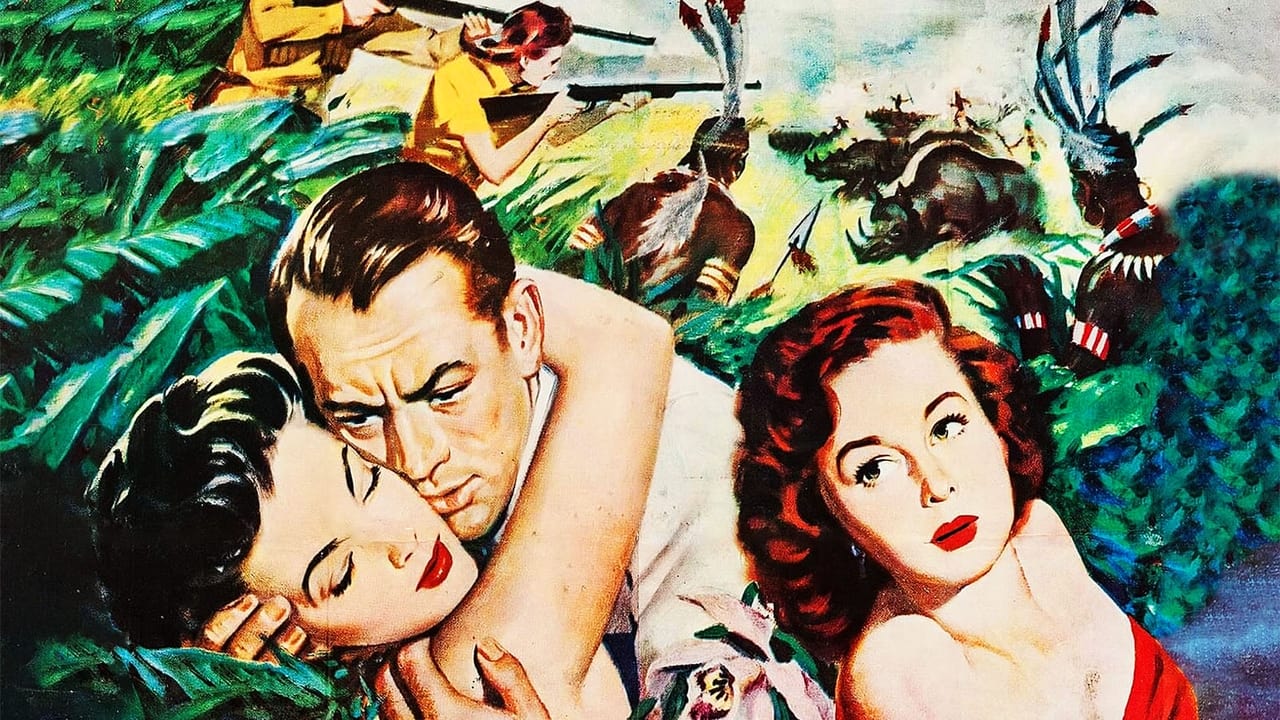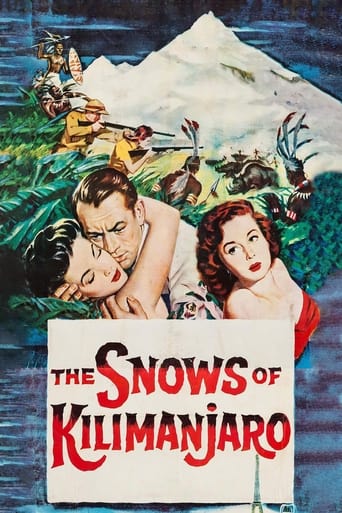Spoonixel
Amateur movie with Big budget
Baseshment
I like movies that are aware of what they are selling... without [any] greater aspirations than to make people laugh and that's it.
Lollivan
It's the kind of movie you'll want to see a second time with someone who hasn't seen it yet, to remember what it was like to watch it for the first time.
Geraldine
The story, direction, characters, and writing/dialogue is akin to taking a tranquilizer shot to the neck, but everything else was so well done.
thinker1691
This movie is based on the memoirs of Ernest Hemingway and is directed by Henry King. In a nut shell the story arises from a injured man who's leg is infected from a thorn lodged in it. The dying man is Harry Street (Gregory Peck) who believes he is dying and begins to reflect on a wasted life. With his third wife (Susan Hayward) at his side, Harry recounts what he considers are the highlights of his writing career. Each segment illuminates the drama of Bullfighting in Madrid, participating in the Franco Spanish war, boating in the Mediterranean sea and on safari in Africa. However, despite all his adventures and having to write his personal exploits, he feels that none of them ever measured up to his real ambition or success. Further, none ever brought him closer to answering his uncle's riddle of 'the snow leopard on the summit of Kilimmajaro.' For fans of Gregory Peck, this movie is slow to excite or entertain as Peck is known as a man of action. Indeed, his cast members which include Leo G. Carroll and Torin Thatcher neither lend or detract from the film. As a result, Peck's death bed recollections are anticlimactically to his other screen roles. Still, his screen appearance is enough to warrant audience attention. Taken as part of his life works' this film is a must, to see or to put it on a shelf as a Classic. ****
Catharina_Sweden
If you have read the Hemingway story you will be disappointed, because this is - surprise! :-) - the Hollywood version of the story (much more simple and shallow and simple) with an altogether different ending. Also, the movie-makers have taken material from other Hemingway stories - about other characters - and mixed with the Kilimanjaro story. Still, it retains something of Hemingway as well.Gregory Peck is handsome as ever, and Ava Gardner is gorgeous as ever. The scenes from Africa are also unusually realistic for the time. One can see that not all of it is shot in a studio.As a woman, I can also relate very much to Ava Gardner's character. She wanted so much to have a child, to have something to hold onto in the world. But when the child she was carrying would have come between her and her lover - or this was what she feared - as it did not fit in with his life plan at that time, she got rid of it, masking the abortion as an accident. Very many women all through the ages, have been in the same situation. And very many men have had it on their conscience.
Steffi_P
At the time he was writing Ernest Hemingway was regarded as one of America's finest literary assets, and virtually all his work was given a prestigious screen adaptation at some point in the 40s and 50s. Short on action but full of introspection, often set in exotic locations, his stories typically made for slow-moving but visually stunning motion pictures."Slow-moving" and "visually stunning" could also loosely describe the style of director Henry King, who helmed this version of Hemingway's short story The Snows of Kilimanjaro. King was by no means dull, and he never got hung up on imagery, but he certainly encouraged a thoughtful style from his cast and had a love of natural beauty. His shots of the outdoors are unique; never expansive, empty landscapes but always layered, detailed compositions that show off shape and contour. There is always a sense of closeness and intimacy in King's pictures, evident from the first few shots of The Snows of Kilimanjaro – a close-up of Gregory Peck, the shadow of a tree branch sweeping across his face, cut with close-ups of him watching the flight of a vulture – a haunting and compelling introduction to the story.And Peck is very much the right man for this sort of thing – deep, serious, with an air of melancholy, but also handsome and charismatic. And of course, a very fine actor. He handles the lengthy stretches of dialogue well, putting character into Hemingway's words. And his women here are equal matches, especially Susan Hayward, who is all quiet confidence. From her voice to the way her arms lie as she sits next to Peck, everything says here is a strong-willed woman, every bit an equal partner in her relationship with Peck. And every bit an attractive woman too. One thing that The Snows of Kilimanjaro suffers from however is a lack of really outstanding supporting players.I haven't read the original Hemingway story on which this is based. Apparently the central theme is supposedly Harry Street's sense of dissatisfaction with his own writing. However, whether it is differences in this adaptation or simply my own impression of it, I was struck far more by Street's rocky love life, in particular the series of disillusioned women he leaves behind him. It is to me the epitome of 1950s melodrama, from the stabbing score of Alfred Newman to the searing shot of Peck and Ava Gardner kissing before the stark backdrop of a tree. And it seems this is how the American public saw it too. Despite its hard-going literary roots, it became the third highest-grossing picture of the year.
evening1
I was surprised to find most of this film version of Hemingway's short-story classic so tepid.Gregory Peck's character is a handsome devil concerned first and foremost about himself. His life has been a quest for fame, yet all his adventures as a writer have provided him with fodder that hasn't added up to much.The women he bedded along the way were mere pretty, powerless distractions. As the doctor tells Peck after Cynthia has miscarried: "Don't you people ever talk?" When they do, they don't actually hear.The most meaningful part of this film was its portrayal of man as a self-deluded creature whose end can come suddenly and ridiculously, as hyenas and vultures lie in wait."Let's not kid ourselves," drawls the cot-bound Harry, who had fancied himself such an alpha male. "A door can open suddenly into nothing. And death has been standing there all the while." Yet the characters fool themselves till the end.A very depressive view of the human condition.

